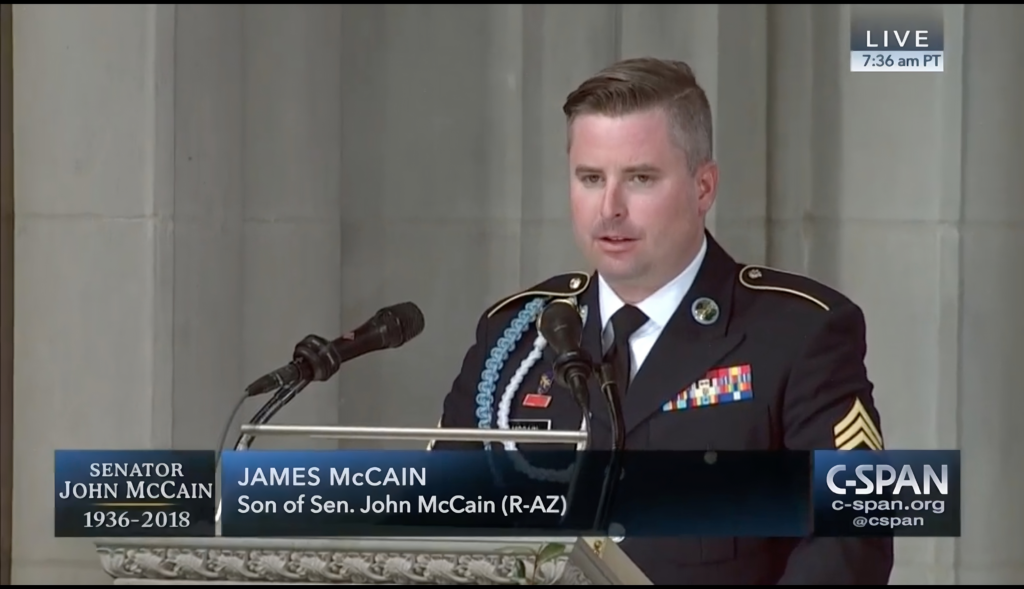John McCain’s Son Registers as a Democrat, Endorses Kamala Harris

Jimmy McCain Condemns Trump’s Arlington Cemetery Campaign Event
Former President Donald Trump’s recent campaign event at Arlington National Cemetery has sparked outrage from 1st Lt. Jimmy McCain, the youngest son of the late Senator John McCain. Describing the event as a “violation” of the sacred space where generations of his family are buried, McCain expressed his deep disappointment and concern over the use of the cemetery as a political backdrop. This incident has further solidified his decision to distance himself from the Republican Party, a move that includes his recent registration as a Democrat and his support for Kamala Harris in the upcoming election, according to a report by CNN.
A Shift Away from the GOP
Jimmy McCain’s response to Trump’s Arlington event is part of a broader shift in his political alignment. Having served in the military for 17 years, McCain’s decision to register as a Democrat and support Kamala Harris marks a significant departure from his family’s traditionally conservative values. While other members of the McCain family, such as his mother Cindy and sister Meghan, have criticized Trump, Jimmy is the first to publicly abandon the Republican Party.
For McCain, the use of Arlington National Cemetery as a campaign venue crossed a line. He believes that those buried there, including his father, grandfather, and great-grandfather, should never be used as props for political gain. His disapproval of Trump’s actions reflects his broader disillusionment with the former president, who has previously disparaged his father, a Vietnam War hero and former Republican presidential candidate.
The Arlington Cemetery Controversy
The controversy erupted after Trump visited Arlington National Cemetery following a wreath-laying ceremony honoring 13 U.S. service members killed at Kabul airport’s Abbey Gate in 2021. During the visit, Trump’s campaign filmed the event, leading to an altercation with a cemetery staffer who attempted to prevent the filming. The staffer cited federal law and military regulations that prohibit political activity in the cemetery, but Trump’s team continued to record and later posted the footage online.
The video, which appeared on TikTok, included images of graves beyond those of the Abbey Gate victims, including that of an Army Special Forces soldier who died by suicide. The soldier’s family, who had not given permission for the grave to be filmed, expressed their outrage over the incident.
For Jimmy McCain, who had just returned from a deployment near the Jordan-Syria border, the event was a painful reminder of Trump’s ongoing disrespect for those who serve in the military. McCain believes that Trump’s actions stem from his own insecurities about never having served in the armed forces, contrasting sharply with the sacrifices made by those buried at Arlington.
A Deeply Personal Stand
McCain’s decision to speak out against Trump and shift his political allegiance is rooted in his personal experiences and the memory of his father. Despite the public attacks on John McCain by Trump, Jimmy McCain had previously refrained from engaging in the political debate, believing that criticism of public figures like his father was part of their role. However, Trump’s actions at Arlington National Cemetery, a site deeply connected to his family’s legacy, compelled him to break his silence.
“John McCain was my father, and a lot of people lose that in the minutia,” McCain said. “He wasn’t ‘John McCain’ the way he is to the world. He was the man who loved me. And for me to be with him towards the end of his life, hearing things [from Trump] like, he was a loser because he was captured—I don’t think I could ever overlook that.”
As the 2024 election approaches, Jimmy McCain’s outspoken criticism of Trump and his support for Kamala Harris reflect a broader shift among some conservatives disillusioned with the current direction of the Republican Party. His stance highlights the deep personal and political divides that continue to shape the American political landscape.

